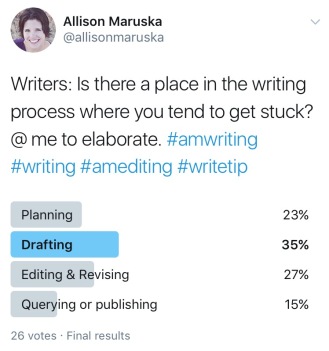Welcome to Part 2 of our blog mini-series on where writers get stuck, based on this poll I took on Twitter.

We started with Planning, though today’s topic is closely related – so closely, in fact, that Dan combined them in his response to Part 1. Drafting issues are often the result of planning issues.
However, there are “specific to drafting” issues as well, and seeing as they came out on top in the poll, many writers struggle with them. Let’s visit a couple of culprits that cause us to get stuck in the drafting stage, or when we turn our plan into a narrative, complete with sentences, paragraphs, and hopefully, a good story.

Culprit 1: The writer doesn’t love the idea enough to stick with it.
In his aptly titled How to Write a Novel, Nathan Bransford says this:
Avarice is what motivates people to write in genres they don’t particularly like. It pushes them to choose ideas that they don’t love enough to make it all the way through the writing of the novel. It’s what makes an already difficult process completely impossible.
Later, he adds this (emphasis mine):
Liking an idea will get you to page fifty. It will give you an initial burst of enthusiasm . . . before you inevitably lose interest, your attention wanders, and you find yourself with an unfinished novel that you feel vaguely embarrassed about.
It may not seem like it during NaNoWriMo, when authors post daily word counts in the many thousands, but writing out an entire novel is a difficult and often long process. Your subject matter has to be something that excites you past page fifty. This isn’t to say you’ll love it every day (quite the contrary – some days you’ll want to throw your computer out the window), but like any long-term relationship, something draws you back. That something is passion for your idea, your characters, or that plot twist coming up. Maybe it’s all of those.
The solution: Write what you’re fired up to write, even if it’s not what you’re “supposed” to write or perhaps won’t sell as well. It won’t sell at all if it’s not written.
Culprit 2: The story veers off the plan.
I’m a plantser, and the one time I outlined a whole novel, I ended up changing most of it. I look back at the outline and laugh. I stuck with the bigger points, but the rest of the scenes – well, let’s just say the story didn’t like the box I’d put it into.
So I obviously don’t have an issue letting my story wander, as long as it makes narrative sense to do that. I suspect, however, that the hardcore planners among us struggle with such a thing – veering can lead to paralysis.
One of the commenters on the poll said endings are a particular challenge, which I 100% agree with. In fact, I usually have to toy with a couple of different endings – meaning at least one wasn’t in the original plan. Remember in Stranger than Fiction, when the author had writer’s block for ten years because she couldn’t figure out the ending? That was less than ideal.
The solution: Let the story wander, and if it doesn’t work, you can always rein it in. Talk out the newer points with writing partners if you’re nervous. But don’t let strict adherence to a plan freeze you in place.
If you’ve gotten stuck in the drafting stage, what happened, and how did you solve it?



Pingback: He Said, She Said: Bloggers Edition #8. – Manuscript. Head. Drawer.
Pingback: Where Writers Get Stuck: Marketing | Allison Maruska
Pingback: Where Writers Get Stuck: Querying and Publishing | Allison Maruska
Pingback: Where Writers Get Stuck: Editing and Revising | Allison Maruska
Both happen to me. My story veers off plan and suddenly I am tens of thousands of words into a story I am not sure I particularly like. When this happens I usually do one of three things. Stop and re-evaluate the plan, Skip ahead to another scene in the plan and write backwards until I find a way to match the two scenes up, or phone a friend and talk through ideas rather than try to work it through in writing.
LikeLiked by 1 person
I’ve jumped ahead to a future scene before. Sometimes that’s all that needs to happen to clear the jam. And talking it out is huge! Good strategies. 🙂
LikeLike
Reblogged this on Author Don Massenzio and commented:
Check out this helpful post from Allison Maruska on the pitfalls writers face while drafting.
LikeLiked by 1 person
Hmm…
As my good friend Jim Patterson says – yes, I call James Patterson Jim – and no he’s never heard of me – although he did take 100 bucks off me for his master’s class…
Anyway
As he said and I agree which is why I am quoting it, more outlining leads to less getting stuck later. OK he didn’t really say that; I pretty much said that but he more or less expressed that sentiment.
So the more you outline the less you’re going to get stuck. (Fight with yourself now or fight with yourself later – and not finish a stuck story.)
However, I’m quick to say I like to have AN ending for my story.
So one story I’m thinking of is a guy who is stationed in an Aleppo type situation and his job is to find former CIA operatives and see if they are still viable or if they have to be terminated. He works with somebody older than him, a woman, who was a young girl during World War II in the post-war Germany.
I have an idea for some scenes and I have an idea for their relationship and I have an idea for what the middle of the story is about. I thought of a great beginning but it’s only great if I don’t do flashbacks and odds are there’s gonna be some flashbacks. I don’t know what the ending is yet so I’m not moving forward yet. (I have a really great ending scene, though – just not what comes before it!)
In a different story that I have already written, The Water Castle, my original idea was this girl would accidentally find a magic portal that would take her back to when Spaniards controlled Florida and she was able to go back and forth through the portal, discovering all sorts of cool stuff about life back then. She meets a young man from that time and they have a romance but at the end of the story it was going to be they all live happily ever after. So my outline was: mostly a story about this young girl, the struggles of being a young teenager, how different today’s world is and how superficial we are and how easy we have it compared to people who live just 100 or 200 years ago or God forbid 400 years ago, and how somebody who is a prince 400 years ago has things much harder than an average person does today. Kind of a social commentary type thing.
But the end was going to be, they live happily ever after. Either he comes to her world and they get married who knows, or she goes to his.
Well, she was kind of a fish out of water nerd type in this world so she was going to go to his. That was the original set up. So she was gonna break the heart of her mother and she was going to go.
But
As I was getting ready to start writing, that ending seemed pretty standard Hollywood nonsense. Boring. It’s-been-done-ish.
And
They’re not going to stay together. Nobody’s going to leave their family. Not her, not him, nobody would do that.
So I said they have to not end up together. They have to break up.
Then I started thinking about stories like Love Story and Titanic, Dr. Zhivago, you guys have heard me say this before – the more memorable stories are the one where the lovers almost get together – and then they don’t. Broken hearts in the story, boxes of Kleenex being used by the readers, immortality for my characters.
Everybody wins. Mostly me.
And that’s the ending I wrote.
That’s not the ending that was outlined. I started writing before I knew that ending.
In Poggibonsi, I knew the ending but I didn’t understand how one of the characters would get through their challenge to be able to make the ending happen. And I was stuck for over a week trying to figure that out because I could not think of a reason for that person to do what they needed to do. I wouldn’t do it and I didn’t know anybody who would. I resolved it and obviously critics agree that it’s a great resolution and a great story and a great ending, but it was a struggle. A struggle that could have suck a really awesome book!
So, my advice? Having done all three methods…
Have an ending before you begin and you will find that many things want to take you away from that ending. All you have to do is decide is if that new destination is better.
In The Water Castle, the new ending blows the doors off. No reason not to do it. And when you read that story you’ll agree.
LikeLiked by 1 person
I agree; something to call an ending is better than nothing. That’s the beauty of writing. We don’t have to get it “right” the first time.
LikeLiked by 1 person
Not as long as they have a delete key!
LikeLiked by 1 person
Very useful advice. I have wandered into novels and developed a plot. This can be scary, because you know that somewhere in the not so deep mists of time you’re going to need to pin a plot down. The plot scenario can equally give you a false sense of security (sorry about the clichés). The characters have to be snatched sometimes out of nowhere and developed to fit the plot it seems. My latest novel started with a pen wander around the main character. It’s a sequel and there was a template with some back story to propel the new one. Now there is a plot. I’m at Chapter 23. It will mean a severe re-write of the early part of the novel, but would the plot have developed without just writing into the story from the start?
LikeLiked by 2 people
I can sure relate to the need for rewrites in the beginning. I would say if your plot developed around your character as you wrote, it wouldn’t have come about another way. I imagine knowing the character was a big part of what ended up being the plot.
LikeLike